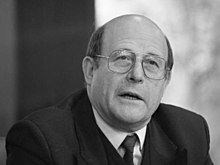Wolfgang Bötsch
Wolfgang Bötsch (born September 8, 1938 in Bad Kreuznach ; † October 14, 2017 in Würzburg ) was a German politician ( CSU ). From 1993 to 1997 he was the last Federal Minister for Post and Telecommunications .
Life and work
Born in Bad Kreuznach , Bötsch grew up in Lower Franconia . After graduating from high school in 1958, Bötsch did military service in the Air Force . From 1959 he studied law and political science at the Julius Maximilians University of Würzburg and at the German University of Administrative Sciences Speyer . After completing his legal internship , he also passed the second state examination in law. In 1970 he received his doctorate as Dr. jur. utr. with the work The various ways to eliminate splinter parties in the free part of Germany . From 1968 to 1974 he was a councilor in Kitzingen . From 1974 he was a senior councilor in the government of Lower Franconia.
In addition to his political activities, he had additional functions in the economy.
Wolfgang Bötsch was a member of the supervisory boards of BI-LOG AG, a stock corporation for logistics solutions, Bamberg , and Com & Con AG, Grünwald (chairman). He also worked as a consultant for the lobby agency EUTOP Munich , InfraTec Consult GmbH Eisingen , MS Management-Service AG St. Gallen (Switzerland) and the SUP-Societät für Unternehmensplanung GmbH Frankfurt am Main .
From 1998 Bötsch worked as a consultant for Gemini Consulting. In 2000 he joined the law firm Gassner, Stockmann und Kollegen (GSK) as a specialist in public and telecommunications law. In addition, Bötsch was a consultant to the media entrepreneur Leo Kirch . Bötsch received 300,000 DM annually for his consulting work.
Wolfgang Bötsch was married and had two children, including the Würzburg city councilor Christine Bötsch (CSU).
Political party
Since 1960 he was a member of the CSU. Here he was initially involved with the RCDS and the Junge Union . From 1973 to 1991 he was chairman of the CSU district association Würzburg-Stadt.
MP
From 1972 to 1976 he was a member of the city council of Würzburg. From 1974 to 1976 he was a member of the Bavarian State Parliament .
From 1976 to 2005 he was a member of the German Bundestag . From 1982 to 1989 he was parliamentary manager of the CDU / CSU parliamentary group . From April 1989 to January 1993 he was chairman of the CSU regional group and first deputy chairman of the CDU / CSU parliamentary group. From October 1998 to October 2002 he was finally legal advisor of the CDU / CSU parliamentary group.
Wolfgang Bötsch has always entered the Bundestag as a directly elected member of the Würzburg constituency .
Public offices
On January 21, 1993 he was appointed Federal Minister for Post and Telecommunications in the Federal Government led by Federal Chancellor Helmut Kohl . During his term of office, the preparations for the privatization of the Deutsche Bundespost fell , which led to the dissolution of the postal ministry on December 31, 1997. Bötsch thus left the federal government. From January 1, 1998, the remaining tasks of the Ministry of Post were taken over by the Federal Ministry of Finance , the Federal Ministry of Economics and the newly established regulatory authority .
See also
Honors
In 1997 he was honored with the Great Cross of Merit with Star and Shoulder Ribbon of the Order of Merit of the Federal Republic of Germany .
literature
- Rudolf Vierhaus , Ludolf Herbst (eds.), Bruno Jahn (collaborators): Biographical manual of the members of the German Bundestag. 1949-2002. Vol. 1: A-M. KG Saur, Munich 2002, ISBN 3-598-23782-0 , pp. 85-86.
Web links
- Biography at the German Bundestag
- Literature by and about Wolfgang Bötsch in the catalog of the German National Library
- Wolfgang Bötsch in the parliamentary database at the House of Bavarian History
Individual evidence
- ↑ Last German Post Minister Wolfgang Bötsch is dead . Märkische Allgemeine , October 15, 2017, accessed on October 16, 2017.
- ↑ EUTOP. Lobbypedia, accessed October 16, 2017 .
- ^ End of an era: the last post office minister said goodbye. German Society for Post and Telecommunications History , December 17, 1997, accessed on October 16, 2017 .
| personal data | |
|---|---|
| SURNAME | Bötsch, Wolfgang |
| BRIEF DESCRIPTION | German politician (CSU), MdL, MdB |
| DATE OF BIRTH | September 8, 1938 |
| PLACE OF BIRTH | Bad Kreuznach |
| DATE OF DEATH | October 14, 2017 |
| Place of death | Wurzburg |
